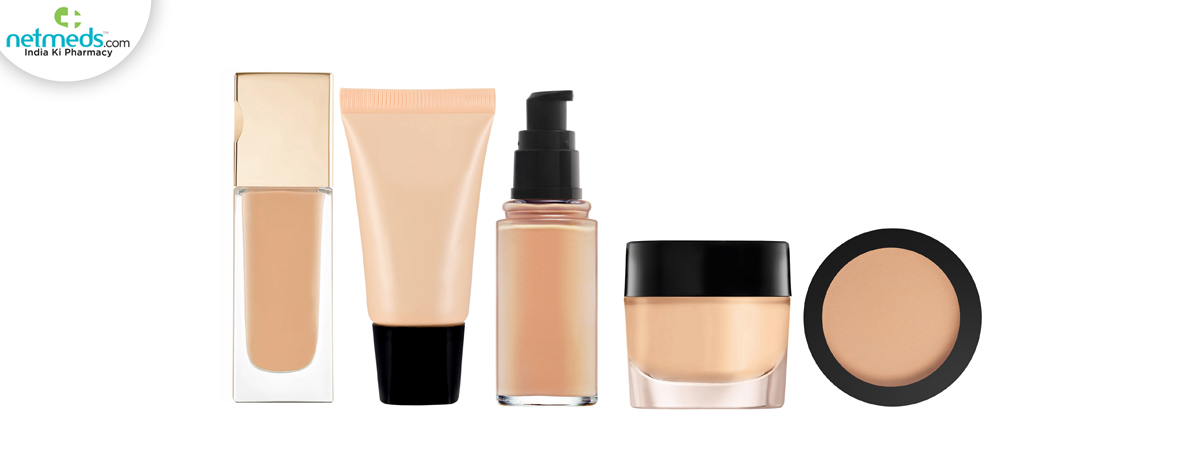Selecting the ideal foundation is a little bit like dating; you sample some, set your expectations high, only to be let down when it doesn't live up to the way you envisioned. We have all been there, sweeties: too cakey, too oily, too dry, wrong undertone. The fact is, your base isn't all about colour; it is about your skin type, texture, and lifestyle as well. So, whether you want a natural finish for everyday use or a long-lasting base for a wedding or any other special event, picking the right formula is the secret to a perfect look.

Also Read: Bought A Darker Shade Foundation? 7 Quick Fixes To Lighten And Match Your Skin Tone
In this guide, we simplify how to choose the perfect foundation for your skin's specific needs, with some tips from pros on steering clear of the most frequent blunders. Let us make foundation shopping a lot simpler and more effective!
Select The Appropriate Foundation Of Your Choice From Our Extensive-collection Of Brands!
Step-By-Step Guide To Select The Ideal Foundation For Oily, Dry, Combo & Sensitive Skin
Step 1: Know Your Skin Type
Before buying any foundation, understand your skin's basic needs. Here is a quick refresher:
Oily Skin: Tends to get shiny, especially in the T-zone.
Dry Skin: Feels tight, rough, or flaky.
Combination Skin: Oily in some areas (like the forehead and nose), dry in others.
Sensitive Skin: Easily irritated, prone to redness or breakouts.
Pro Tip: When in doubt, blot with blotting paper or get a skin analysis done by a dermatologist/esthetician.
Also Read: Want To Buy the Best Face Makeup Products? Here's Your To-Do List

Step 2: Find a Formula That Suits Your Skin Type
For Oily Skin:
Opt for matte or oil-free foundations. Powder or water-based liquid foundations work to keep the shine under control and last longer.
Best bets: Soft matte liquid, powder compact, oil-free stick foundations.
For Dry Skin:
Choose hydrating or dewy-finish foundations. Cream and liquid foundations with built-in moisturisers are great.
Best bets: Liquid foundations containing hyaluronic acid, BB/CC creams, cream compacts
For Combination Skin:
Equilibrium is the goal. Select semi-matte or buildable formulas that moisturise dry areas without clogging oily areas.
Best bets: Liquid foundations with variable coverage or mousse textures.
For Sensitive Skin:
Steer clear of fragrances, alcohol, and extreme preservatives. Opt for hypoallergenic, dermatologist-tested foundations.
Best choices: Mineral foundations, tinted moisturisers with SPF, dermatologist-recommended formulas
Step 3: Don't Forget the Undertone
Your undertone is just as important as your surface skin color.
Cool undertones: Search for foundations containing pink, red, or blue undertones.
Warm undertones: Use golden, yellow, or peach-based foundations.
Neutral undertones: Find a combination of cool and warm tones.
Try a few shades along your jawline in daylight to discover the most natural-looking match.

Step 4: Coverage & Finish Preferences
Select according to the desired look:
Light coverage: For day, no-makeup kind of looks.
Medium coverage: Even out tone but still looking natural.
Full coverage: Best for occasions or to cover blemishes and pigmentation.
Finishes are:
Matte: Oil-free, smooth finish.
Dewy/Luminous: Shining, glowing face.
Natural/Satin: In between.
Step 5: Try Before You Buy
Always test before committing; most beauty stores offer testers or samples for this reason. When trying a foundation, apply it on your jawline or the side of your face rather than your hand. Then, wait at least 15 minutes to let the product settle into your skin. Finally, check the shade in natural lighting to ensure it blends seamlessly and matches your skin tone.
Bonus Tips:
Apply a primer appropriate to your skin type to extend the life of foundation.
Fix your base with translucent powder or setting spray.
Change formulas seasonally. You may require more moisturizing one during winter and matte one during summer.
Conclusion
The proper foundation can turn your makeup life around, but it begins with knowing your skin. Take these pro tips, test wisely, and you'll be radiant with confidence (and excellent coverage) in no time. The most important thing to keep in mind is that makeup needs to feel as great as it appears!
Frequently Asked Questions
What is the longest-lasting foundation for oily skin?
Search for long-wear, oil-free, and matte formulas that have such expressions as "shine control" or "oil-absorbing."
Can I blend two foundations to achieve my ideal shade?
Absolutely! Most people mix two shades to fit their skin tone and undertone precisely.
Is BB cream superior to foundation for everyday use?
If you desire light coverage and extra skincare advantages, BB creams are excellent for everyday use.
How do I prevent foundation from appearing cakey?
Use a light primer, apply thinly and blend well with a damp beauty sponge.
What is the best foundation for sensitive or acne skin?
Select non-comedogenic, fragrance-free, and dermatologist-tested formulas, ideally mineral-based.
(This article is reviewed by Kalyani Krishna Chief Content Editor)
Author Profile
Soumita Basu:
Soumita Basu holds a Bachelor’s Degree in Pharmacy and is keenly interested in Ayurveda, home remedies, yoga, fitness, diagnostics, and beauty. With nearly 6 years of experience, she produces evidence-based health content, including articles, videos, and infographics, to provide valuable insights to her audience.



 Previous
Previous